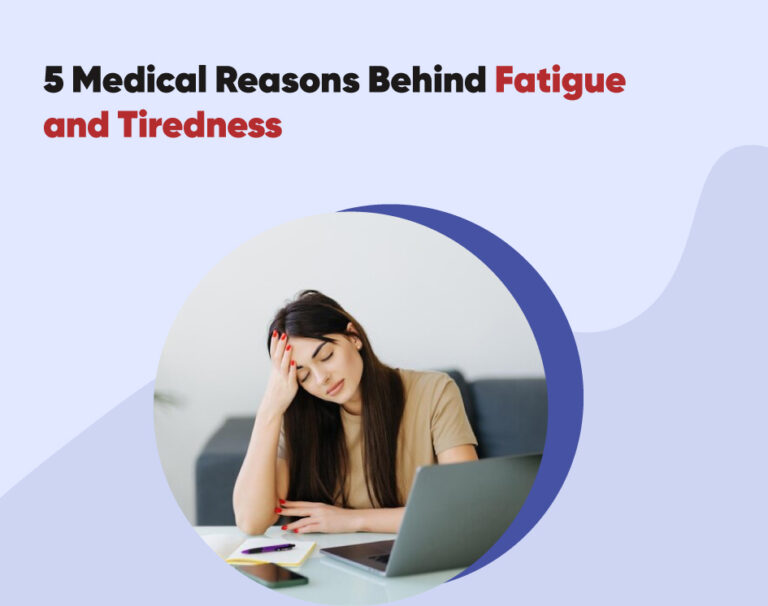
5 Medical Reasons Behind Fatigue and Tiredness
We’ve all had those days when tiredness seems like a constant companion. And we quickly brushed it off with a good night’s sleep. Yet, fatigue becomes a relentless force, lingering despite ample rest. Then, it signals that something deeper may be at play.
Do you know what fatigue is?
Fatigue is a continuous and limiting tiredness. When you experience tiredness, you have unknown, constant, and recurring fatigue. It’s comparable to how you feel when you get sick or lack sleep. Do you suffer from chronic fatigue or systemic exertion intolerance? If this is the case, you may feel you have yet to sleep. Alternatively, you may be unable to do your job at work or home. You may also be too tired to manage your daily affairs.
Now, let’s understand five medical conditions that can turn ordinary tiredness into persistent fatigue.
5 Medical Causes of Fatigue and Tiredness
Medical causes – extreme tiredness may indicate an underlying sickness or condition. Flu, chronic fatigue syndrome, thyroid issues, heart disease, or diabetes are examples of diseases. Alcohol or drugs and a lack of regular exercise can all contribute to weariness. The following are some of the more specific causes of fatigue:
1. Depression and Anxiety
Feeling down or anxious occasionally is a normal part of being human. However, sometimes, these emotions refuse to fade and become your constant companions. Further, they can evolve into disorders affecting our mental well-being and physical energy. The persistent cloud of depression or the continuous buzz of anxiety disrupts our sleep. Besides, it leaves us tired throughout the day.
2. Diabetes
Tightness or fatigue may be the initial whispers of diabetes. Diabetes is a medical condition extending beyond its well-known symptoms. Excessive night urination, unquenchable thirst, and recurrent infections often accompany elevated blood glucose levels. The body’s struggle to efficiently use glucose becomes evident. This situation results in persistent tiredness that’s not easily shaken off.
3. Underactive Thyroid or Hypothyroidism
The thyroid, a small yet mighty gland, regulates metabolism. When it falters, as in hypothyroidism, the impact on our energy levels is profound. Low levels of thyroid hormones associated with this condition manifest as fatigue. With this issue, you will often experience weight gain, dry skin, and cold intolerance.
4. Sleep Apnea
Sleep Apnea, a stealthy disruptor, announces its presence during the night. As those affected sleep, their airway may intermittently collapse, disrupting breathing patterns. The result is often loud snoring and a drop in blood oxygen levels. Additionally, this leads to disturbed sleep patterns and overwhelming exhaustion during the day.
5. Anemia
Anemia, frequently a consequence of nutritional deficiencies, is a common yet potent contributor to fatigue. Beyond the well-known culprits like iron, deficiencies in B12 and folate can also play a role. However, anemia isn’t solely nutritional. But it can signal underlying bone marrow disorders. Some of them are hemolytic anemia, aplastic anemia, myelodysplastic syndrome, and, more rarely, blood cancers.
Simple Solutions for Fatigue and Tiredness
Feeling tired or fatigued doesn’t always require complex solutions. Here are some simple steps you can take to boost your energy:
Stay Hydrated
Dehydration can contribute to fatigue. So, ensure you drink enough water throughout the day to keep your energy levels up.
Prioritize Sleep
Establish a consistent sleep routine. Try to create a comfortable sleep environment to promote restful and rejuvenating sleep.
Healthy Nutrition
Nourish your body with well-balanced meals packed with essential nutrients. Make sure that you have the energy needed to face the day.
Light Exercise
Incorporate light physical activity into your routine. Like what? Go on a short walk or do stretching. These small routines will increase blood flow and invigorate your body.
Stress Management
Try to know why you are feeling stressed. Manage stressors through relaxation techniques, deep breathing, or activities that bring you joy.
Finishing Up
If fatigue or excessive tiredness becomes a constant companion, contacting a nearby physician is crucial. Do a basic Complete Blood Picture (CBP) and check haemoglobin levels. This examination will provide you with helpful information. Moreover, it will help you in identifying any potential health problems at an early stage. These haemoglobin levels should be normal. If not, further evaluation for the mentioned disorders becomes necessary. Let me tell you the bright side of these disclosures. Early detection allows effective treatment. This will pave the path for a quick and positive recovery.
Try to understand the medical reasons behind fatigue. You know, it is like deciphering our body’s language. It acts as a reminder that our bodies speak to us. The first step toward reclaiming our energy is to pay attention to these signals. Likewise, you can live a more active life. Interpret fatigue’s whispers and set out on a path to fresh health.






